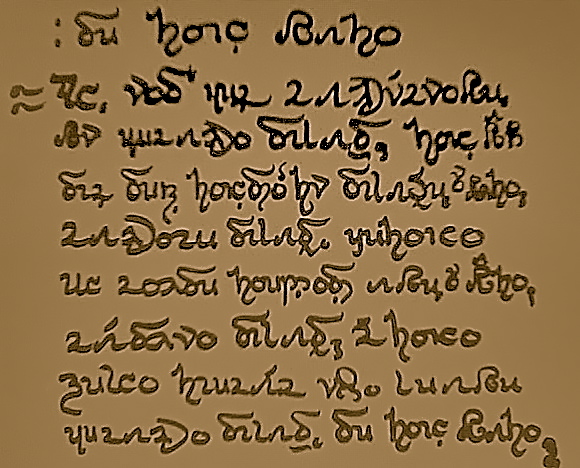| Torch: |
Ud, ëas' ini noskénëavi,
Vë inoska sulos. Manda voma.
Sunu sinti mandasya 'më sulophi,
noskani sulos, imanda voma.
Id naksi maissiasya ovi,
nóskëa sulos. Në manda voma.
Tilda muinón ehya liovi
Inoska sulos, si manda voma. |
| Smooth translation: |
'Behold there, I am beside the shore,
while the ocean crashes. It drifts away.
I want to drift away on the ocean
the crashing ocean, drifting away.
There are all my dreams, upon it
that the ocean is crushing. And it drifts away.
Seeing the ship of my wife,
the ocean crashing, I drift away.' |
| Glossary/mini dictionary |
ë-
be (ay-stem, V)
ehya
my, mine
emë
on (+loc)
id
see, behold, there are, there is (proximal)
ini
beside (+loc)
lio
wife (o-stem, N)
maD-
bring, take (D-stem, V); (3rd sg. present: manda)
maD-
voma 'drift away'
maissë
dream (ay-stem, N)
muino
ship, boat (o-stem, N)
naksi
all
në
and
nosk-
crash (intr.) (said of waves hitting the shore); crush (tr.) (sk-stem, V)
noskenë
edge of the sea, shore, marge (ay-stem, N)
o-
it (oblique stem)
si
I
siT-
me (oblique stem)
su-
want (u-stem, V) (always passive)
sulos
wave, ocean (s-stem, N)
til-
see (l-stem, V)
ud
behold, there is, there are, see (distal)
vë
as, while
voma
back, away
Suffixes:
-a-
thematic vowel
-si
1st singular
-vi
locative case (-phi, in s-stems)
(i-)...-[n/d]a
conjunctive gerund
-na
nominal gerund
-sya/-hya
1st singular possessive suffix (-hya after vowels)
-ani
present participle (cannot take arguments)
-[n]ëa
adjectival gerund
-n
accusative (disappears before -s-)
-ni
pronominal dative (after oblique stems, metathesis with consonants)
-nV
passive/impersonal 3rd singular (V = vowel of root, repeated) |
| Grammar notes |
1. When a subject pronoun is used, it is placed before the verb, which is in
the 3rd person (regardless of the person of the subject). This is because this
is really a reduced cleft stentence: si tilíno 'it's me who sees him.' = 'I see
him'.
2. The locative can express alienable possession (i.e. possession in which
the possessum is not necessarily possessed, only incidentally possessed. That
is, the difference between 'my arm' and 'my book').
3. The adjectival gerund can be used with arguments to form a reduced
relative clause. This distinguishes it from the present participle which cannot
take arguments. Thus, one might say that (roughly) the adjectival gerund is more
transitive than the present participle.
4. Modifiers generally precede the noun (at least in this poem, but this is a
poetic- style).
5. The conjunctive gerund indicates circumstantial meanings (since, because)
or simultaneous meanings (while).
6. The i- in the conjunctive gerund can be stylistically dropped.
7. The subject of the nominal gerund is either genitive (if nominal) or a
possessive suffix (if pronominal).
|
